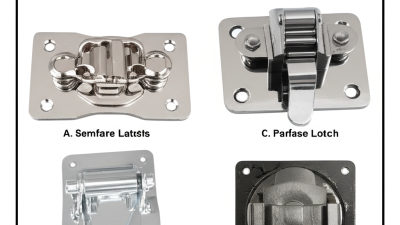Leave Your Message
When it comes to transporting sensitive equipment, the choice of a reliable flight case latch is crucial. The design of flight case latches not only determines the security and accessibility of the cargo but also plays a significant role in the longevity and durability of the case itself. In this tutorial, we will explore the various designs of flight case latches and their unique advantages tailored for different applications. Whether you're a professional musician seeking sturdy locks for your instruments, a photographer requiring quick access to gear, or an audio engineer needing dependable storage for valuable equipment, understanding the intricacies and functionalities of these latches is essential. Join us as we dissect the features, benefits, and suitable uses of the best flight case latch designs available in the market today.

The Evolution of Flight Case Latch Designs has seen significant advancements, particularly when considering the diverse applications these latches serve in the modern age. In 2025, the focus has shifted towards improving security and ease of use while catering to various industries, from music and entertainment to shipping and storage. The newest designs not only provide robust protection but also enhance user experience with features such as improved accessibility and durability against environmental factors.
Much like the meticulous testing of bike locks, where the most robust options are often recommended to deter potential thieves, flight case latches are undergoing rigorous evaluations to determine their effectiveness and resilience. The most secure latches will likely incorporate advanced materials and locking mechanisms, making them a deterrent against unauthorized access. As professionals seek reliable solutions for transporting valuable equipment, the evolution of these latches remains crucial, blending security with functionality to meet the demands of various applications.
When it comes to transporting professional equipment, the importance of heavy-duty latches cannot be overstated. These robust components play a crucial role in ensuring the security and integrity of your valuable gear during transit. Heavy-duty latches are designed to withstand significant stress and impacts, providing a reliable safeguard against accidental openings or damage. Their sturdy construction not only adds to the durability of flight cases but also boosts the overall confidence of users in trusting their equipment to withstand challenging conditions.
Tip: When selecting heavy-duty latches, consider materials such as stainless steel or reinforced plastic. These materials enhance resistance to corrosion and wear, making them ideal for frequent travel.
Moreover, the various latch designs available cater to different applications, ensuring versatility across industries. From simple pull-down mechanisms to more advanced locking systems, each design offers distinct benefits. This allows users to choose latches that best meet their specific needs while enhancing operational efficiency.
Tip: Always test the latch functionality with your equipment in mind to ensure it operates smoothly and secures your gear effectively. This proactive approach can save you from potential mishaps during transport.
In the world of protective cases, the significance of latches cannot be overstated, particularly when it comes to enhancing mobility. Innovative lightweight latch options are paving the way for more portable flight cases, crucial for professionals in industries such as music, film, and sports equipment. According to a recent report by the Freedonia Group, the demand for lightweight materials in protective cases is expected to increase by over 5% annually through 2025, driven by the need for enhanced mobility in transport and handling.
Lightweight latches, such as those crafted from advanced composites and aluminum alloys, not only reduce the overall weight of the case but also maintain structural integrity and security. For instance, a study by Technical Insights highlights that using lightweight latches can decrease the total weight of a case by up to 20%, significantly benefitting frequent travelers. These innovations allow for easier maneuverability and less physical strain on users, making them particularly advantageous for artists and professionals who often transport sensitive equipment. Such advancements are essential in meeting the evolving demands of an increasingly mobile workforce.
| Latch Design | Material | Weight (g) | Durability Rating | Typical Applications |
|---|---|---|---|---|
| Quick-release Latch | Aluminum | 40 | High | Audio Equipment Cases |
| Locking Latch | Steel | 60 | Very High | Sensitive Electronic Gear |
| Compression Latch | Plastic | 30 | Medium | Lightweight Travel Cases |
| Push-button Latch | Zinc Alloy | 35 | Medium to High | DJ Equipment Cases |
| Cam Latch | Stainless Steel | 50 | High | Transportation Cases |
When it comes to flight case design, user-friendly features are essential
for ensuring quick access and seamless operation. One of the most vital components is the
latch design, which must not only secure the contents but also
allow for easy opening while on the go. Latches that incorporate ergonomic shapes and intuitive mechanisms
can significantly enhance user experience. For example, toggle latches with
quick-release features enable users to access their
gear without fumbling or wasting time, making them ideal for fast-paced environments like live performances
or traveling artists.
Moreover, the material choice for latches plays a crucial role in their functionality. Lightweight yet
durable materials can provide the strength needed to keep cases closed, while additional features like
rubber gaskets can protect against dirt and moisture.
Designs that prioritize easy-handling, such as oversized D-rings or sliding mechanisms, can allow for
quicker maneuverability. When these user-friendly elements are integrated into latch systems, they not
only improve accessibility but also contribute to the overall efficiency and reliability of flight cases
in various applications.
When selecting latches for flight cases, it’s essential to consider the materials used in their construction. The choice between durability and weight often plays a pivotal role in their functionality across applications. While traditional metal latches have long been favored for their robust nature, advances in composite materials are reshaping this landscape. These modern materials can provide comparable strength while significantly reducing the overall weight, which is especially advantageous for frequent travelers or transportation of sensitive equipment.
Composite materials not only enhance the efficiency of latches but also bring additional benefits such as resistance to corrosion and improved fatigue performance. This can lead to a longer lifespan for flight cases, thereby enhancing their value over time. As industries continue to innovate, the adoption of lightweight composites in latch design could provide solutions that meet a spectrum of needs, balancing the demanding requirements of durability with the desire for minimal weight. Whether for rugged outdoor adventures or secure transport of delicate instruments, the evolution of latch materials is an exciting development worth exploring.
